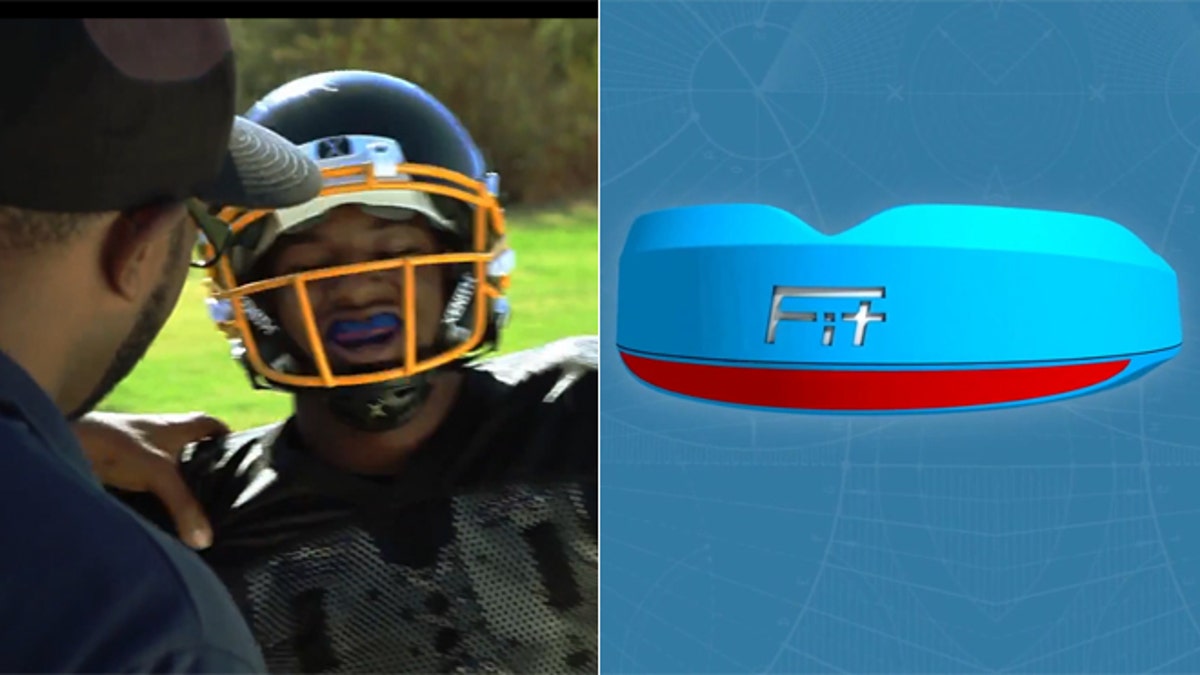
Left, an unidentified athlete outfitted with a FITGuard reports to his coach after a head impact, with the LED lights flashing red. Pictured right is a prototype photo of the FITGuard when it flashes red, signaling a high impact hit. (FITGuard)
A new company is looking to land a punch in the fight against concussions by providing youth athletes with technologically enhanced mouth guards.
Force Impact Technologies (FIT) has developed a mouth guard— called the FITGuard— that is outfitted with LED lights meant to alert coaches and players of a potentially traumatizing head impact.
“We’re targeting youth athletes because research shows concussions and mild-trauma brain injuries are starting far earlier than people realize,” Bob Merriman, co-founder and chief operating officer of FIT, told FoxNews.com.
“Addressing them [concussions] at the high school level or earlier is important, but we want to get in there and call them out even earlier,” Merriman said.
According to the Centers of Disease Control and Prevention (CDC), 173,285 traumatic brain injuries— including concussions— are treated in children and adolescents from birth to 19 years every year. The CDC reports that the numbers and rates of these injuries are highest among high school athletes partaking in football and girls’ soccer.
A single concussion may have a lasting impact on the brain, resulting in long-term structural damage. A study from the New York University Langone School of Medicine found that patients who had suffered from a concussion, or mild traumatic brain injury (MTBI), had significant damage in certain portions of their brains a year after their injury.
The LEDs in the FITGuard are programmed to flash three different colors— green, blue or red— depending on the impact. Red indicates severe impact, while green indicates low impact. If the impact is not dangerous, the mouth guard will not flash any color.
Users can input their information, including sex, age and gender, into the device through an app also developed by the company.
“Research shows males and females have different sensitivity to concussions, but so do adults and children below 13 or 14 years of age,” Merriam said.
The mouth guard stores data from an impact and is paired with a Bluetooth or mobile device so that information can be downloaded and patterns monitored. Data is stored in a cloud, which allows a user to go back to previous recorded impacts, according to Merriam.
The company focused on a product that can be molded to the upper-rear molars after consulting with University of Southern California pediatricians and an orthodontist with more than 15 years’ experience.
“They advised us that a device that is affixed to the upper-rear molars has the highest correlation to the center of the brain,” Merriam said. The front of the FITGuard is outfitted with technology which measures linear and angular acceleration as well as duration of the impact.
Dr. Adam Bartsch, a mechanical engineer and researcher whom FoxNews.com previously consulted for coverage of the Jolt Sensor— a clip on device meant to measure head impact— also said that the industry should be aiming for a device that could attach to the teeth.
“Probably the worst thing you can do if you are trying to accurately or precisely measure impact is attach it to hair, helmet, padding,” Bartsch told FoxNews.com.
The company emphasizes that the device is not meant to diagnose concussions, but rather indicate to a coach or parent when an athlete needs further evaluation.
“Our overall goal is to raise awareness about a condition called second impact syndrome,” Merriam said. Second impact syndrome occurs when an athlete re-enters play too quickly and a second injury occurs. The results can be fatal.
Another consequence of second impact syndrome can be chronic traumatic encephalopathy (CTE), which can only be diagnosed during an autopsy. CTE can cause a patient to suffer memory loss, aggression, confusion and depression, according to the Cleveland Clinic.
“It [second impact syndrome] impacts children exponentially more than adults— that’s why you don’t see NFL players dying, or college players, but unfortunately it seems every year a few high school players lose their lives,” Merriam said.
The FITGuard, which comes with a rechargeable case, is slated to begin clinical testing later this year at USC, and the company is preparing for the first production run of the beta unit with field testing planned for early next year.
The washable, water-proof mouth guard will initially be priced at $129, with a goal of offering the product for under $100. A custom mouth guard for athletes with braces will also be licensed to dentists, Merriam said.
The company is providing production updates on its Indiegogo page.
